-
Courses

Courses
Choosing a course is one of the most important decisions you'll ever make! View our courses and see what our students and lecturers have to say about the courses you are interested in at the links below.
-
University Life

University Life
Each year more than 4,000 choose University of Galway as their University of choice. Find out what life at University of Galway is all about here.
-
About University of Galway

About University of Galway
Since 1845, University of Galway has been sharing the highest quality teaching and research with Ireland and the world. Find out what makes our University so special – from our distinguished history to the latest news and campus developments.
-
Colleges & Schools

Colleges & Schools
University of Galway has earned international recognition as a research-led university with a commitment to top quality teaching across a range of key areas of expertise.
-
Research & Innovation

Research & Innovation
University of Galway’s vibrant research community take on some of the most pressing challenges of our times.
-
Business & Industry

Guiding Breakthrough Research at University of Galway
We explore and facilitate commercial opportunities for the research community at University of Galway, as well as facilitating industry partnership.
-
Alumni & Friends

Alumni & Friends
There are 128,000 University of Galway alumni worldwide. Stay connected to your alumni community! Join our social networks and update your details online.
-
Community Engagement

Community Engagement
At University of Galway, we believe that the best learning takes place when you apply what you learn in a real world context. That's why many of our courses include work placements or community projects.
News & Events
 HEALTH BEHAVIOUR IN SCHOOL-AGED CHILDREN (HBSC) IRELAND
HEALTH BEHAVIOUR IN SCHOOL-AGED CHILDREN (HBSC) IRELAND
World Health Organization Collaborative Cross-National Study
Health Behaviour in School-aged Children (HBSC) is a WHO collaborative cross-national study that monitors the health behaviours, health outcomes and social environments of school-aged children every four years. HBSC Ireland surveys school-going children aged 9-18 years. The study is conducted by the HBSC Ireland team, based at the Health Promotion Research Centre, University of Galway.
Latest News
New Data Visuals - September 2025
The following visualisations present data from the report The Irish Health Behaviour in School-aged Children (HBSC) Study 2022.
- HBSC Ireland 2022 General Health and Wellbeing
- HBSC Ireland 2022 Smoking, Alcohol and Cannabis Use
- HBSC Ireland 2022 Food and Dietary Behaviours
- HBSC Ireland 2022 Exercise and Physical Activity
- HBSC Ireland 2022 Self Care, Sun Safety Behaviours and Injuries
- HBSC Ireland 2022 Physical Fighting and Bullying
- HBSC Ireland 2022 Middle Childhood Study
Back To School: Reporting on Ireland’s Generational Trends (1998-2022) - 22 August 2025
The latest article in Cois Coirib, the University of Galway's online platform,, highlighting the views and opinions of some of the university’s top academics and researchers, features a review of our recently published Trends report Trends in Health Behaviours, Outcomes and Contexts: 1998-2022. The article includes a snapshot of findings from the report, a video of the launch and reflections on HBSC from Professors Colette Kelly and Saoirse Nic Gabhainn, Co-Principal Investigators of HBSC Ireland. The articel can be viewed at https://impact.universityofgalway.ie/articles/back-to-school-reporting-on-irelands-generational-trends-1998-2022/
New IPH report on sunbed use and policy options - 9th July 2025
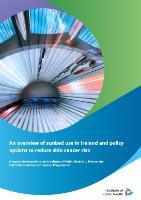
HBSC Ireland data is a key source for a new report published by the Institute of Public Health (IPH) which recommends a ban on sunbeds to reduce the risk of skin cancer in Ireland, which has one of the highest skin cancer rates in the world.
The comprehensive report, ‘An overview of sunbed use in Ireland and policy options to reduce skin cancer risk’, analysed available data on sunbed users, sunbed availability, current regulations on sunbeds and associated infringements, as well as policy options introduced internationally to reduce skin cancer risks associated with sunbed use.
The report was developed to support the Department of Health and HSE’s National Cancer Control Programme (NCCP) National Skin Cancer Prevention Plan (2023-2026) and the 2025 Programme for Government commitment to explore a ban on commercial sunbed use.
Sunbed use
Data on sunbed use in Ireland shows that sunbeds continue to be used by children and adolescents despite regulations restricting their availability to anyone under the age of 18:
- 2% of children aged 10-17 years reported ‘ever’ using a sunbed
- 4% of children aged 10-17 years reported using a sunbed in the last 12 months
- Sunbed use is similar among boys and girls and among pre-teen and teenage children.
IPH Director of Policy, Dr Helen McAvoy, said: “Our report provides evidence that sunbeds are still being used by children and young people despite existing regulations restricting their availability to anyone under the age of 18. Using sunbeds increases your risk for skin cancer; it is not safe to use a sunbed at any age.
“A ban on sunbeds has been shown to work. In Australia, it is estimated to have prevented tens of thousands of skin cancers and led to significant health cost savings. Introducing a similar ban on sunbeds in Ireland could help to stem skin cancer rates, which are projected to double over the next 20 years.”
Minister of State Jennifer Murnane O’Connor, with special responsibility for Public Health, Wellbeing and the National Drugs Strategy, said, “This report reinforces what we already know—there is no safe level of sunbed use. Skin cancer is the most common form of cancer in Ireland, and we must act decisively to protect our population, particularly our young people, from preventable harm. The evidence is clear: sunbeds are still being used by children and young people, despite legal restrictions. This is deeply concerning. We must do everything within our power to protect people from its harms in order to save lives and reduce the burden of cancer on our health service.“
The report: Reynolds, C.M.E., Rodriguez, L., O’Connor, L. &, McAvoy, H. (2025). An overview of sunbed use in Ireland and policy options to reduce skin cancer risk. A report developed by the Institute of Public Health to inform the HSE’s National Cancer Control Programme. Dublin & Belfast: Institute of Public Health. ISBN: 978-1-913829-52-0. DOI: 10.14655/11971-1084927 download
Ahead of the launch of the report the HSE’s NCCP and IPH held an event to inform future policy options to reduce skin cancer risk in Ireland.
Speakers included:
- Opening address from Minister for Public Health, Wellbeing and the National Drugs Strategy Jennifer Murnane O’Connor
- Ciara Reynolds, Institute of Public Health
- Maria McEnery, HSE’s National Cancer Control Programme
- Jane Murray, patient advocate
- Dr Aoife Lally, Consultant Dermatologist
- Craig Sinclair, Cancer Council Australia
The presentations were recorded on the day and can be watched back by clicking here.
HBSC Ireland Trends Report 1009-2022 - 3rd June 2025
The HBSC Ireland report Trends in Health Behavious, Outcomes and Contexts: 1988-2022 is now available.
 Launched on Tuesday 3rd June, by the Minister of State at the Department of Health with special responsibility for Public Health, Wellbeing and the National Drugs Strategy, Jennifer Murnane O’Connor TD, the report presents findings on the health and wellbeing of children in Ireland between 1998 and 2022. To date, HBSC Ireland has collected data from 70,533 school-aged children aged 10-17 years across the Republic of Ireland. The report describes the self-reported health status of children in Ireland over time in relation to key indicators: health behaviours, health outcomes and the contexts of their lives. Internationally comparable trends data are also included.
Launched on Tuesday 3rd June, by the Minister of State at the Department of Health with special responsibility for Public Health, Wellbeing and the National Drugs Strategy, Jennifer Murnane O’Connor TD, the report presents findings on the health and wellbeing of children in Ireland between 1998 and 2022. To date, HBSC Ireland has collected data from 70,533 school-aged children aged 10-17 years across the Republic of Ireland. The report describes the self-reported health status of children in Ireland over time in relation to key indicators: health behaviours, health outcomes and the contexts of their lives. Internationally comparable trends data are also included.
Data visuals of the findings are available:
Trends in Health Behaviours 1998-2022
Trends in Age of Initiation 1998-2022
Trends in Health Outcomes 1998-2022
Trends in Health Contexts 1998-2022
HBSC Team win Dean's Award 2025 - 28 May 2025
The HBSC Ireland team were the winners of the Dean's Award for Outstanding Communication & Contribution to the College of Medicine, Nursing & Health Sciences.
 Professor Saoirse Nic Gabhainn, Co-PI of HBSC Ireland, with team members Aoife Gavin, Ruchika Mathur and Dr Viv Batt pictured after receiving the award at the CMNHS all staff meeting on Wednesday 28th May 2025.
Professor Saoirse Nic Gabhainn, Co-PI of HBSC Ireland, with team members Aoife Gavin, Ruchika Mathur and Dr Viv Batt pictured after receiving the award at the CMNHS all staff meeting on Wednesday 28th May 2025.
Congratulations to all past & present HBSC Ireland team members.
download a copy of the Nomination of HBSC for the award.
download a copy of the slides with information on HBSC Ireland
European Health Report 2024 - 25 February 2025
Professor 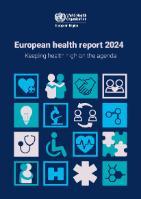 The European Health Report is produced every 3 years as a flagship publication by the WHO Regional Office for Europe. This edition, which features HBSC Ireland data, is based on the indicators included in the WHO European Programme of Work, 2020– 2025 – “United Action for Better Health” measurement framework.
The European Health Report is produced every 3 years as a flagship publication by the WHO Regional Office for Europe. This edition, which features HBSC Ireland data, is based on the indicators included in the WHO European Programme of Work, 2020– 2025 – “United Action for Better Health” measurement framework.
This 2024 Report finds that the health of the people in the WHO European Region continues to be negatively affected by an accumulation of hard-to-tackle threats and new hazards that require our urgent attention in the aftermath of the coronavirus disease (COVID-19) pandemic.
Download from the WHO https://www.who.int/europe/publications/i/item/WHO-EURO-2025-10668-50440-76183
Ireland’s Youth: Informing Health Policy and Practice Through Research - 4 February 2025
Professor Colette Kelly and Professor Saoirse Nic Gabhainn, Co-PIs of HBSC Ireland reflect on the many years of HBSC Ireland findings and the impact it has had on policy and strategy around children and young people's health and wellbeing. Read the article at https://impact.universityofgalway.ie/articles/irelands-youth-informing-health-policy-and-practice-through-research/
EU Country Cancer Profile: Ireland 2025 - 3 February 2025
HBSC Ireland data is featured in the EU Counrty Cancer profile: Ireland 2025. The profile identifies strengths, challenges and specific areas of action on cancer prevention and care as part of the European Cancer Inequalities Registry, a flagship initiative of Europe’s Beating Cancer Plan. It provides a short synthesis of: the national cancer burden; risk factors for cancer (focusing on behavioural and environmental risk factors); early detection programmes; and cancer care performance (focusing on accessibility, care quality, costs and quality of life).
‘Stastical Spotlight #15: The State of the Nation’s Women and Girls’ - 20 January 2025
HBSC Ireland data is featured in the report ‘Statistical Spotlight #15: The State of the Nation’s Women and Girls’. The report collates available data on the lives of women and girls across five key areas: demographics, health, education, employment and, poverty and social vulnerability. The report provides statistical analysis in each area and examines trends over time. This Spotlight shines a light on how women and girls are faring in Ireland today and over the past decade, focusing on areas like life expectancy, physical activity, educational attainment, subject choice in education, employment rates, the gender pay gap, female representation in parliament, poverty rates and much more.
Statistical Spotlight #15: The State of the Nation’s Women and Girls download
Data sheet: The State of the Nation’s Women and Girls download
World Children's Day - 20 November 2024
On 20 November 2024, World Children’s Day, WHO/Europe and the United Nations Children’s Fund (UNICEF) are releasing 10 evidence-based fact sheets that will drive an ambitious new strategy for child and adolescent health and well-being in the years ahead. The fact sheets not only present the latest available data and identify critical challenges but, crucially, highlight solutions and opportunities for action.
The fact sheets cover crucial areas including early childhood development, breastfeeding, obesity, mental health, digital environments, providing services to adolescents, sexual and reproductive health, refugee and migrant children, the impact of COVID-19 on education, and mortality. They will serve as a foundation for evidence-based policy-making as countries work to implement the new strategy.
For more information see https://www.who.int/europe/news/item/20-11-2024-future-proofing-the-european-region-s-children--who-and-unicef-release-powerful-new-evidence-for-action-on-health
HBSC Ireland data is included in 4 of these factsheets:
Child and adolescent health in the WHO European Region: adolescent mental health fact sheet. download
Child and adolescent health in the WHO European Region: digital environment fact sheet. download
Child and adolescent health in the WHO European Region: impact of COVID-19 on education fact sheet. download
Child and adolescent health in the WHO European Region: overweight and obesity fact sheet. download
Latest HBSC International Report - Launched 13 November 2024
Launched today, the report ‘A focus on adolescent social contexts in Europe, central Asia and Canada’ is the seventh in a series of international reports using data from the Health Behaviour in School-aged Children (HBSC) survey 2021/2022.
The report is available to download from https://iris.who.int/handle/10665/379486
This report, Volume 7 in the series, focuses on the social context of adolescents’ lives. It describes the status of adolescent family and peer relationships and school experiences, the role of gender, age and social inequality, and changes in adolescents’ social context over time.
Latest HBSC International Report - Launched 25 September 2024
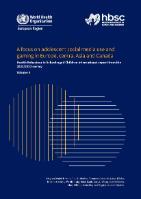
Launched on Wednesday 25th September 2024, the report ‘A focus on adolescent social media use and gaming in Europe, central Asia and Canada’ is the sixth in a series of international reports using data from the Health Behaviour in School-aged Children (HBSC) survey 2021/2022.
The report is available to download from https://iris.who.int/handle/10665/378982
The report reveals a sharp rise in problematic social media use among adolescents, with rates increasing from 7% in 2018 to 11% in 2022. This, coupled with findings that 12% of adolescents are at risk of problematic gaming, raises urgent concerns about the impact of digital technology on the mental health and well-being of Europe's youth.
HBSC International Report - Launched 29 August 2024
-141x199.jpg)
Launched on Thursday 29th August 2024, the report ‘A focus on adolescent sexual health in Europe, central Asia and Canada’ is the fifth in a series of international reports using data from the Health Behaviour in School-aged Children (HBSC) survey 2021/2022.
The report is available to download from https://iris.who.int/handle/10665/378547
This fifth report provides crucial insights into the sexual health and behaviours of 15-year-olds across 42 countries and regions.
The report reveals alarming trends in adolescent sexual health across Europe, central Asia, and Canada. Approximately 30% of sexually active 15-year-olds reported using neither condoms nor contraceptive pills at last intercourse, putting a substantial proportion of young people at risk of sexually transmitted infections (STIs) and unintended pregnancies. This risk is compounded by a significant decline in condom use since 2014. While sexual initiation rates have remained relatively stable, with a slight decrease among boys, substantial variations exist between countries.
Lead author, and HBSC Ireland team member, András Költő was interviewed on RTE Drivetime on 3rd September. Listen to the interview at https://www.rte.ie/radio/radio1/clips/22429139/
HBSC International Report - Launched 23 May 2024
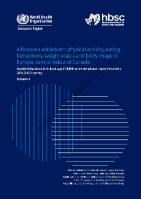 Launched today, the report ‘A focus on adolescent physical activity, eating behaviours, weight status and body image in Europe, central Asia and Canada’ is the fourth in a series of international reports using data from the Health Behaviour in School-aged Children (HBSC) survey 2021/2022.
Launched today, the report ‘A focus on adolescent physical activity, eating behaviours, weight status and body image in Europe, central Asia and Canada’ is the fourth in a series of international reports using data from the Health Behaviour in School-aged Children (HBSC) survey 2021/2022.
The report is available to download from https://iris.who.int/handle/10665/376772
This fourth report examines the status of moderate- to-vigorous and vigorous physical activity, physical inactivity, food and drink consumption, over- and underweight and body image among adolescents, explores the role of gender, age and social inequality and identifies how these adolescent behaviours have changed over time.
HBSC Ireland 2022 National Report - Launched 2 May 2024
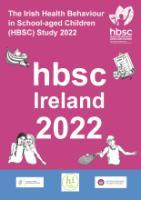
The Irish Health Behaviour in School Children (HBSC) Study 2022 was launched via an online webinar on Thursday 2nd May at 10.00am.
download the full report here:
Gavin, A., Költő, A., Lunney, L., Maloney, R., Walker, L., Nic Gabhainn, S., & Kelly, C. (2024). The Irish Health Behaviour in School-aged Children (HBSC) Study 2022. Dublin: Department of Health & Galway: Health Promotion Research Centre, University of Galway. download
The report presents data collected in 2022 from over 10,000 participants. HBSC Ireland would like acknowledge all the parents and children who consented and participated as well as the management authorities, principals and teachers in all schools that participated.
Watch a recording of the launch webinar.
download a copy of the presentation given by Aoife Gavin at the launch.
download a copy of the press release.
HBSC International Report - Launched 25 April 2024

Launched today, the report ‘A focus on adolescent substance use in Europe, central Asia and Canada’ is the third in a series of international reports using data from the Health Behaviour in School-aged Children (HBSC) survey 2021/2022.
The report is available to download from https://iris.who.int/handle/10665/376573
This third report focuses on cigarette smoking, e-cigarette use, alcohol consumption and drunkenness, and cannabis use (only measured among 15-year olds) across 44 countries and regions.
The report highlights a narrowing gender gap in substance use, emphasising the need for targeted prevention strategies.
HBSC International Report - Launched 27 March 2024
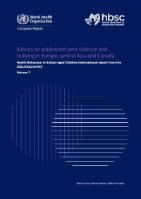
Launched today, the report ‘A focus on adolescent peer violence and bullying in Europe, central Asia and Canada’ is the second in a series of international reports using data from the Health Behaviour in School-aged Children (HBSC) survey 2021/2022.
The report is available to download from https://bit.ly/hbsc-vol2
This second report focuses on patterns of bullying and peer violence among adolescents across 44 countries and regions.
While the overall trends in school bullying have remained stable since 2018, cyberbullying has increased, magnified by the increasing digitalisation of young people’s interactions, with potentially profound impacts on young lives.
State of the Nation's Children 2023
25 January 2024
HBSC Ireland data is included in the most recent edition of the State of the Nation's Children (SONC) report.
SONC provides a comprehensive picture of children's lives by presenting key information on children’s health, behavioural and educational outcomes as well as their relationships with their parents and their friends. It also presents data on supports and services available to children.
SONC, published biennially since 2006, and annually since 2020, is widely used as a resource by policy makers, the research community and civil society, and aims to inform Government policy on children, young people and families.
















